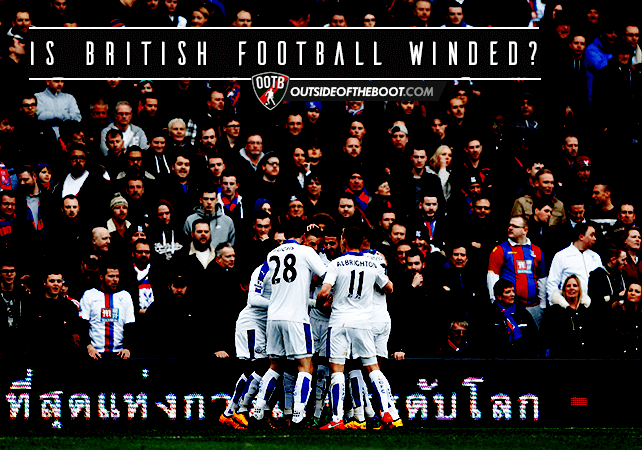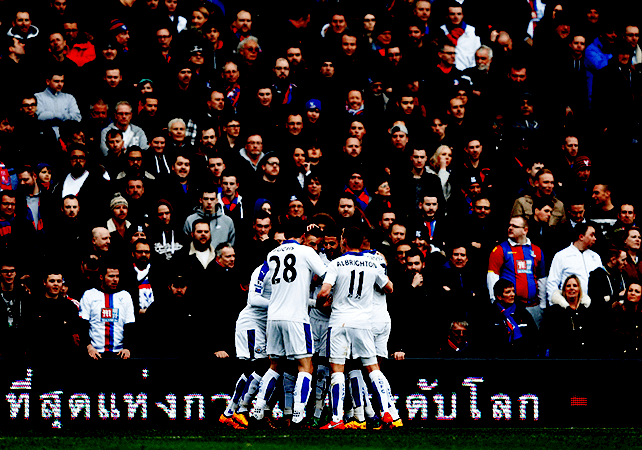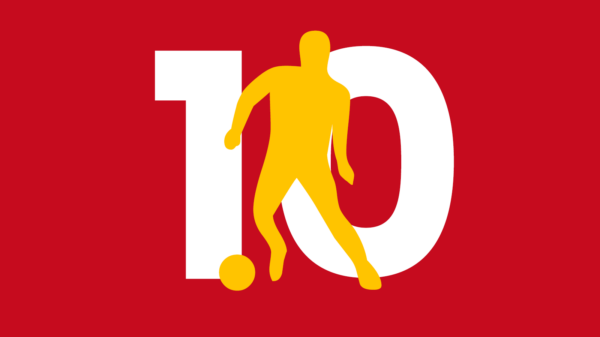Andrew Thomas makes his debut for us with a cracking article about wind, England, and technical footballers.
Excuse the pun, but it’s a pun worth pursuing so please bear with me…
I remember reading an excellent book by Gabrielle Marcotti and Gianluca Vialli a couple of years ago entitled ‘The Italian Job’, it was an insightful and intelligent read, very different to the usual football literature I had accumulated over the years.
One thing from that book that has stuck with me all this time was the idea that the weather in the UK was detrimental to the development of great technical players, and playing great football.

“One of the first things I had to get accustomed to as soon as I arrived in England was the weather. And I don’t mean the temperature or the rain but, most of all, the wind. The wind ruins everything. It forces you to do only one type of exercise. It forces you to work on either speed or continuous movement. It’s very rare that you get the chance to sit calmly and work on technique or on tactics. You have to keep the players moving, otherwise they get cold. And this is something which begins way back when they are children.”
– Arsene Wenger
“It’s all about the climate. I had a long discussion about it when I went to Scotland to see Andy Roxburgh. I worked with a Scottish youth side and had them do the same drills I would do in Italy. I realised that, between the wind, the rain and the cold, there was no way they could do it. How can you possibly teach anybody anything in those conditions? To me, it’s pretty obvious and it explains why Brazilians are more technical than Europeans and, in Italy, the further south you go the more technical they are.”
– Fabio Capello
The book demonstrated some research conducted on wind speeds comparing three cities in England (Manchester, Birmingham, London) with three cities in Italy (Milan, Turin, Rome) and found that the average wind speed was 50% higher in the UK, particularly during the autumn/winter football season. You wouldn’t usually think that the findings of a handheld anemometer would make much difference to a game of football, but many elite coaches would disagree.
And I think I forgot about much of this until quite recently when Jurgen Klopp made reference to the weather:
“The English game is not faster than the German game. Perhaps there are a few more sprints. But there is a different style of football here, partially due to the weather,”
“The wind can be quite extreme in England. We are not familiar with that in Germany and you have to keep things simple. Stoke City’s first goal against Manchester United was a perfect example of the extreme winds. Players who are not from the UK have to get used to the winds.”
“I have to adapt my style of football as a result as well. Often, you are forced to keep things simple. And there are a lot more duels for the second ball here, and more duels in general. That makes the game even more intense.”
“The wind was crazy because it changed all the time. For both teams it was really difficult,”
“In this time you cannot take this game and say ‘This is how football should be’. Wind is the biggest enemy of football but we did okay.”
- Jurgen Klopp, December 2015
And then we fast-forward to February, and Klopp was asked his opinion as to things that Guardiola should be prepared for in the English game when he eventually takes the reigns at Manchester City. You can guess his answer:
“The wind surprised me. It’s often windy here,”
- Jurgen Klopp, February 2016
As a keen amateur footballer myself, I can testify to the magnificence of a Sunday morning spent trying to stand up and keep my concentration in the middle of a howling Force 8 wind (Force 12 is a hurricane…) on the Isles of Scilly, 28 miles off the coast of Cornwall, England.
You can’t play football. Between the wind, the wind-chill that brings the temperature down to very low single figures, and the rain that slaps into your already-frozen face, it’s often left me feeling very deflated of a weekend. I think this is compounded by me being a ‘technical footballer’( ie I’m not quick) .When you turn up and the conditions are regularly atrocious, it tests your love for the game, especially when you feel like you’ve not enjoyed a second of it due to the game descending into the carnage that is British football as we know it.
We are about to see Leicester or Spurs crowned champions, and in no way can you claim either side are a great technical team. Spurs were utterly humiliated 3-0 against Dortmund last week, and though I think they can preserve some pride in the return leg, I can’t see the referee allowing Spurs to impose themselves on the Germans as they would to a team in the PL.
On match-day the professional game is somewhat more protected from bad weather than the amateur game because professionals play in high-sided stadiums that offer a bit of shelter from the raw conditions. But many training grounds for professional sides are not within high-sided stadiums, and hence the comments from Wenger earlier.
Such training facilities are usually far superior to those of the youth teams in many cases, and amateur playing fields are usually in isolated, exposed areas where the wind and rain can take a run-up before it assaults you. So, to me, it’s little wonder that technical players are an endangered species in the UK, the weather makes them either totally ineffective for most games, and/or they don’t even get picked in sides as the manager puts more emphasis on players who ‘drive forward’ with the ball at their feet or are out-and-out pace merchants who can chase a long-ball behind a defence.
Gerrard was a product of his environment, he could stand up in a gale and dominate a game through sheer willpower and physical strength with the ball at his feet. You wonder if he might have developed into more of a number 10 and been a better player had he been able to concentrate on playing that position in his youth development, but seldom is a number 10 position used in youth circles in the professional or amateur game.
But the more technical players often have to be hybrids of physicality and technical skill, and so we never quite see the emergence in Britain of smaller technical attacking players like Insigne, or Bernard, or Xavi, or Iniesta, or Silva, or Ozil, or Gotze etc. If you’re a dinky little technician you have to have a lot of pace to get away from the opposition in this country especially. So it’s no surprise to see Mahrez, Sanchez, De Bruyne, Payet, Hazard (when he can be bothered) excelling in the league usually, whereas Cazorla, Silva, Coutinho, Eriksen, Ozil do some things that can be fantastic, but overall there are many games where their impact on games is minimal.
You may highlight that Ozil is currently the top assist provider in the PL, but I don’t think West Ham fans would swap Payet for him, nor Leicester fans would swap Mahrez for him, nor Everton fans would swap Barkley for him, nor Spurs fans would swap Alli for him.
Same with centre forwards, you need only look at the top strikers in the scoring charts to see what attributes are successful in this league. Kane, Vardy, Lukaku, Ighalo, Giroud, Costa, none of them would likely win World Player of the Year and light up a World Cup because 90% of their attributes are based on physicality or speed. In fact, those six players have a combined 115 international caps, and 30 goals. You just can’t transfer those attributes to the more technical arenas of football. Alan Shearer, Andy Cole, Robbie Fowler, Les Ferdinand, Jermaine Defoe, Ian Wright, Dion Dublin, Emile Heskey, Darren Bent…we’re talking about the top scoring English players in the PL of all time, and they for the most part weren’t the standard needed to win a CL, or an international tournament.
Those with a bit more craft, the likes of Sheringham, Rooney, Owen, were the better footballers and had physical attributes to help them express that talent, be it pace or strength or both in the case of Rooney. Now that Rooney’s pace has left him, you see a far less effective PL striker, but he could still be top scorer for England in the Euros this summer.
Barcelona can dominate Spain because they can mix technical and physical attributes effectively. Players like Iniesta, Xavi, Busquets can dominate an opposition midfield because they play in a league where referees frown upon physical contact and aggressive tackling, and also because the weather mostly lends itself to technical football.
When La Liga and the PL meet in the Champions League, it’s mostly the Spanish sides that come out on top against PL clubs because CL referees do not allow overly-physical players like Wanyama, Fellaini, Tettey, McClean, Milner, Noble, Colback, Dier, Coquelin, Brunt, Adam, Barry, Yacob, Matic, to thrive. I’m not saying they are bad players, at all, but their role in teams is often to ‘shut-down’ the opposition, and to do it through being very physical with their opposition’s most creative players.
As we all know, and hate, the likes of Barcelona spend most of their time going to ground at the slightest contact, and getting the award from the referee in almost every case. PL teams just aren’t designed to play CL football.
Just look at the list of technical players who have come to the PL and not made much of an impact due to the conditions in which football is played, and the mindset of managers who set their sides up:
Oscar, Pedro, Cazorla, Lamela, Tadic, Navas, Clasie, Afellay, Saivet; just a few current players that came to the division with much promise due to their technical ability, and yet have rarely seen success.
Basically you need speed AND power to make a difference in the attacking third in this league. Youth coaches know it, managers know it, and that’s why we hear the old adage ‘yeah, but can he do it on a cold wet Wednesday night at Stoke’?
Quite often they can’t, but they could still go on to be great footballers and achieve a lot on much bigger stages than the PL.
Written by Andrew Thomas.
- Euro 2016: Parking the bus is not cool - June 23, 2016
- Rivals: Manchester United vs Liverpool | The feisty fixture in the North West of England - April 4, 2016
- Is British football ‘winded’? - March 24, 2016


























































